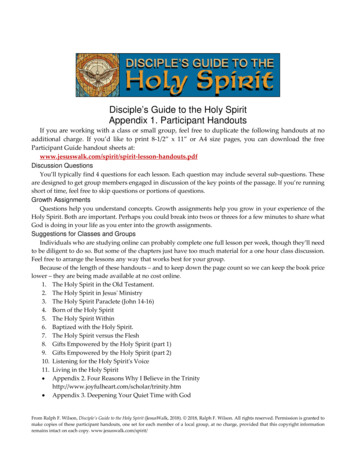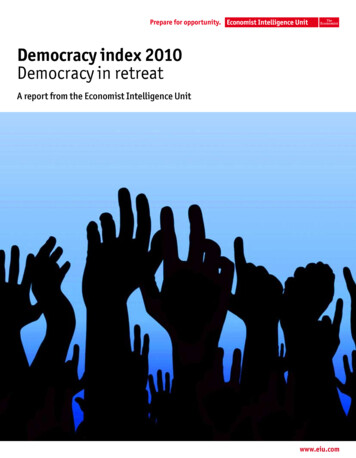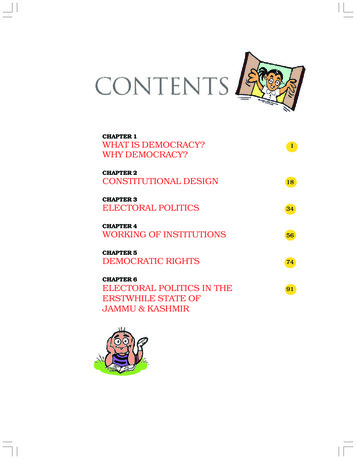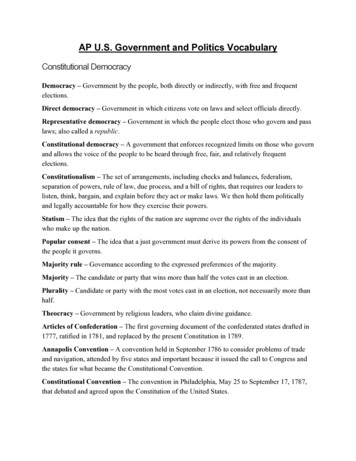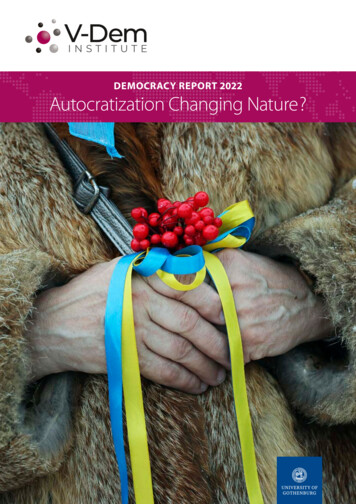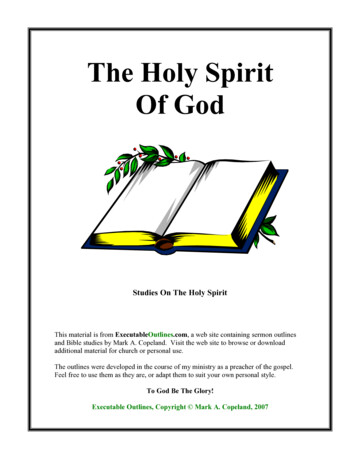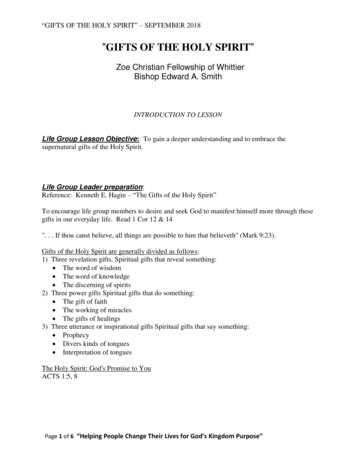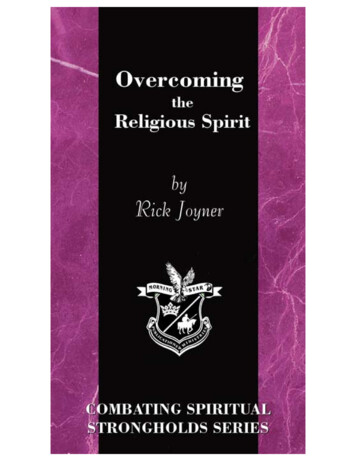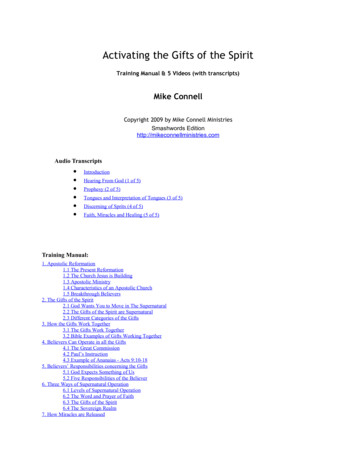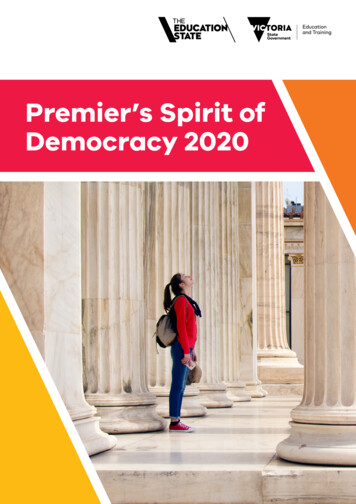
Transcription
Premier’s Spirit ofDemocracy 2020
State of Victoria (Department of Education and Training) 2021Premier’s Spirit of Democracy is provided under a Creative Commons Attribution4.0 International licence. You are free to re-use the work under that licence, onthe condition that you credit the State of Victoria (Department of Education andTraining), indicate if changes were made and comply with the other licence terms,see: Creative Commons Attribution 4.0 InternationalThe licence does not apply to: any images, photographs, trademarks or branding, including the VictorianGovernment logo and the DET logo; and content supplied by third parties.Copyright queries may be directed to copyright@education.vic.gov.au
ContentsMinister’s Foreword. 6Consul General’s Foreword.7From Athens to Australia: A tale of democracyM Bannon.10Shadow of democracyNikala Bervanakis. 12After-class conversationsInnayat Brar.14A democratic transition: Australia’s democracy in a new worldEirene Carajias. 18Evolution of democracyToby Clack.22UntitledScarlett Cuthbertson. 24The influence of Greek democracy on modern – day AustraliaVictoria Day. 26The development of democracy: From Athens to AustraliaJ Gallos . 28Equality, access and youth: The cornerstones of democracyJames Golob.30The successful system?Lainey M Karlich. 32The philosophy of democracyJackson Mangold.34Ancient democracy is often viewed as a system of governmentwhere the citizens of the city-state held the power. Is this an accurateobservation of the democratic model in modern day Australia?Amy Norton.364
Democracy essayNell Osborne Grigg.38How democracy has shaped AustraliaAmelia Puckering. 40Then and now: Democracy in AustraliaMaximus A Sandler. 42Expository essay on Australian democracyPriyanshi Sharma.44Democracy in modern AustraliaNoah Slater.46The autocratic properties within Australia’s democracyRani Thuan.48The imperfection of democracyCassie Tudge.50Ancient democracy is often viewed as a system of governmentwhere the citizens of the city-state held the power. Is this an accurateobservation of the democratic model in modern day Australia?Lachlan Van Veen. 52The birth of democracyChloe Ward.54A curious encounterJasmine Xu.56Welcome to ‘Democracy Tonight’Elwyn Carlile. 58#democracyathenstomelbMarymaeve Hartsthorne. 60The ancient roots of modern democracySumaer Singh Grewal. 625
Minister’s ForewordCivics and citizenship education is acornerstone of Victorian education. It instilsin young people the skills to be active andinformed citizens who can participate in andstrengthen our democracy. These benefits arefelt far beyond the school gates, as studentscontinue to shape the future of Victoria andour nation.It is my great privilege to commend to youthis compilation of entries written by thewinners and runners-up of the inauguralPremier’s Spirit of Democracy Program.In 2019, Victorian students in Years 10-12were invited to draw upon classical Greekphilosophers, such as Plato and Aristotle, toprepare a personal reflection, short story, orexpository essay responding to the topic:Ancient democracy is often viewed as asystem of government where the citizensof the city-state held the power. Is this anaccurate observation of the democraticmodel in modern day Australia?The topic invited them to take a close lookat the complexity of our civic structures, thephilosophies upon which they are built, andthe ideals they strive to uphold. It asked themto critique our success in our endeavour tosustain democracy in contemporary society.6Premier’s Spirit of Democracy 2020This book contains 25 outstanding studententries. Each reflects the student’s writingand critical thinking skills, as well astheir dedication to their studies. Thesewritings offer unique insights into the keenperceptiveness of our young Victorians, givingus new and important perspectives on socialissues and visions for our collective future.Each student, their schools and families canfeel very proud.The Hon James Merlino MPDeputy PremierMinister for EducationMinister for Mental Health
Consul General’s ForewordDemocracy as a system relies on the emphasisof educational opportunities for young people.Civics education plays a vital role in helpingyoung people make informed choices abouttheir futures and the ways in which they willchoose to lead each other as well as futuregenerations. It is, after all, the responsibilityof today’s young, not only to safeguard theachievements of previous generations, butprimarily to work on further enhancing andfine-tuning their governing system in order toserve an ever-evolving society.It is my honour to join the Deputy Premierand Minister for Education and MentalHealth, the Honourable James Merlino MP,in congratulating the 25 student authorspublished in this book.While some scholars may say that Greekcivilization has been around for so long thatGreece has had a chance to try nearly everyform of government, we are perhaps mostproud of our contribution to democracy.We have a long history of democracy, fromits ancient Athenian roots, to present daysystems of government, which uphold therights of individuals and their communities.As Greece celebrates the bicentenary of theGreek War of Independence this year, it istimely to acknowledge that the modern GreekState, through its pioneering Constitutionaltexts, was founded on solid principles ofrepresentative democracy, like wide civicparticipation, protection of fundamentalrights and distinction of State powers andfunctions. These principles remain in theepicentre of our social and political thought,both in Greece and Australia.It is my great pleasure to support thePremier’s Spirit of Democracy program,which enables Victorian students to explorepolitical philosophy and reflect on its role inmodern societies. This collection of essaysdemonstrates the students’ deep interestand passion for civics, citizenship, philosophyand contemporary politics. This passion is aprerequisite, as well as a guarantee, for theformation of commendable future citizens.I congratulate all the students on theirinspiring work.!Emmanuel S. KakavelakisConsul General of Greece, Melbourne7
Ancient democracy isoften viewed as a systemof government where thecitizens of the city-stateheld the power. Is this anaccurate observation ofthe democratic model inmodern day Australia?8Premier’s Spirit of Democracy 2020
9
From Athens to Australia: A taleof democracyM BannonPrinces Hill Secondary College, Year 11In 508BCE Cleisthenes, the so-called “Fatherof Athenian Democracy”, established thefirst-ever democracy in Athens followingthe tyrannical rule of Hippias. After the exileof Hippias, Cleisthenes began a series ofpolitical reforms called demokratia, or “ruleby the people”, originating from the wordsdemos “people,” and Kratos meaning power.In his improvements of the Athenian society,he persuaded the people of Athens to formgroups not based on family ties but onarea, known as a deme. These demes kept aregister of their own citizens and could electits own officials. This made a more inclusiveAthens in which the mixed local tribes formedthe basis of representation in politics. Thisnew democratic system comprised of threeseparate institutions: The Ecclesia was anindependent governing body consisting of40,000 adult citizens, majority rule dictatedforeign policy and formed laws. The Boule,a council of 500 men from the ten Atheniantribes (50 from each) who decided whatissues the Ecclesia would vote on, and theDicastery public courts in which citizenswould argue cases before a group of elderlyjurors, who, in the absence of police officers,dealt with citizens under persecution. Anotherlaw introduced was Ostracism, where anycitizen could be expelled from Athens formore than ten years as voted by the majority.Philosophers were quite critical of CleisthenesGovernment, men such as Socrates and Platodisliked democracy for they believed that themajority would always form a tyranny againstthe minority, believing that “democracypasses into despotism”. Despite the Atheniandemocracy only surviving for two centuries,it still remains one of the most enduring andinfluential contributions to the modern world,influencing nations such as Australia up untilthis very day.10Premier’s Spirit of Democracy 2020Since this historic event unfolded withinthe 6th century, many countries includingAustralia have based their policies andlaws upon those of the Ancient AthenianDemocracy. Australia’s political systemis quite similar to Ancient Athens, butwith time democracy has changed to suitthe modern world, its laws evolving andadapting with each generation. Despiteboth being governed by a democracy, eachhas their own systems. Ancient Athenswas ruled by direct democracy, in whichthe citizens decided the policies and lawsthemselves, meaning that the citizens ofthe city-state held the power as they werethe decision-makers. Although the citizensonly included the free adult men of Athensand represented only 20% of the population,despite democracy meaning peoples rule,women and slaves were not consideredcitizens and therefore couldn’t participatein politics, contradicting the meaning ofdemocracy. Whereas, Australia is ruled bythe more commonly used representativedemocracy, in which Australian citizen’svote for a Prime Minister to make importantdecisions on their behalf, passing the batononto the Prime Minister and his Government.Although the Prime Minister may hold thepower once being voted in, winning anelection ultimately relies on the citizens ofthe nation and in the end, they decide whorepresents them in parliament. However,lately, it seems that with cases such as Adaniand the School Climate strikes, the citizensaren’t represented and the people struggleto be heard. So unlike the limited citizensof Athens, the various citizens of Australiaare not individually involved in the decisionmaking and therefore do not personallyhold the power. Australia’s laws ensurepolitical equality, allowing more citizens to
WINNERM BannonPrinces Hill Secondary College, Year 11vote, making politics more representativeof Australia’s entire population. The diverselaws share power to women and menalike, regardless of gender or race, makingthe democratic system in Australia morerepresentative of the Australian population,and distancing itself further away from theroots of Ancient Democracy.In my own democratic experience, my familyand I earlier this year got to experiencewhat happens when equality triumphs overinequity. My family and I went through adecade of oppression and in many ways myfather was a dictator. He was the Hippiasto our Athens, his rule over my family wascruel and his selfish decisions put me andmy family at jeopardy. Although this wasn’talways the way, as Plato stated: “tyrannynaturally arises out of democracy”. What heclaimed was best for the family only servedhimself. Once my father left, our family grewand prospered as never seen before. Sincebeing liberated, I was able to place greaterfocus on my passions, getting more involvedin my school council, VicSRC and Rotary clubs,of which democracy plays a very big part. Andwhen combined with my work at the BritishConsulate, allows me to play a large role inyouth work and connecting students acrossall of Victoria. These trials have reinforced mybeliefs that just as my family couldn’t workunder a dictatorship a nation cannot trulyfunction without democracy.Ancient democracy has served as afoundation on which many countries arebased, just like Australia, they have adaptedtheir policies and laws to suit the modernworld and the citizens residing within theirborders. When comparing Athens to Australia,it is impossible for Australia to remain trueto the roots of Ancient Democracy within themodern-day, no longer accurately depictingthe democratic system from Athens, butevolving to be a more representative andequal government.Australia’s laws ensure politicalequality, allowing more citizensto vote, making politics morerepresentative of Australia’sentire population.11
Shadow of democracyNikala BervanakisRosehill Secondary College, Year 11Plato wrote that people are fixated on thematerial prospects of living, and not theperfect forms that exist elsewhere in ourminds. He proposed that only a select fewwho can see beyond the material plane andillusion, are the worthiest leaders; as they’re,in Aristotelian terms, truly ‘virtuous’.The notion that Australians possess the powerto determine how they’ll be managed, isdiminished by the influence of the media andthe questionable motives of parliamentarymembers. Rather than governing like a‘guardian class’, representatives continueto be held prisoner with the rest of society,enchanted by the phantoms of ‘true forms’.Through democracy, power is promised tothe Australian people, however the clutchesof ignorance continue to hold them hostagein a material society. The youth of Australiafighting to re-establish power to theAustralian people are falling victim to theharshness and subversion of democracy.Australian political figures inevitably becomeconsumed by the deficiencies or excess ofAristotle’s ‘golden means’, failing to deliverthe policies that reflect society’s views. Ratherthan promoting potential policies, partiesbelieve that, people respond to disparagingan opposition, instead of advocating theirown proposals. The Australian public isn’tvoting for who they believe is the bestcandidate, rather for the least incompetentof several incompetent options. This lackof information that continues to seizepower from Australian citizens, stems frominadequate parliamentary leadership,illustrating the fragility of humanity.12Premier’s Spirit of Democracy 2020Human nature forbids members of Plato’s‘guardian class’ from remaining virtuousafter assuming the leadership of a nation.Power inexorably corrupts individuals andcompels leaders to obsess over maintainingtheir leadership, rather than what’s goodfor the people, hence exposing a weaknessin Australian government. The three yearsprovided to governments is consumedstrategising ways to be elected for anotherterm, rather than focussing on the dutyto represent Australian citizens. People’sviews become lost in politicians’ narcissism,indirectly undermining their power at theexpense of their deleterious priorities.The Aristotelian expectation that politiciansare to be virtuous has been lost throughthe constant surveillance by the modernmedia. The media’s acute influence overthe beliefs of society has allowed it tobecome a strong driving force of democracy,as it holds the warrant to the success ordownfall of a campaign. The media is likea python tightening itself around the neckof its prey; keeping perpetual control of itsvictim’s movements. The media disallowsany emergence from Plato’s materialcave, cementing society’s existence in the‘shadows’ of imperfect forms.Conversely, the media provides a platform forAustralian youth to protest the government’sinterpretation of the ‘shadows’. In ancientdemocracy, youth were disregarded forbeing irrational. Modern youth are nowable to express their own interpretationsand use various platforms to understandthe potential of ‘true forms’. Youth are the
WINNERNikala BervanakisRosehill Secondary College, Year 11primary advocates for Climate Changeand are breaking through the stigma ofimmaturity, thus condemning the immoralactions of the government and defending thepower that belongs to the Australian people.Through exposure and communicationin the media, youth are demanding the‘shadows’ be remodelled into a form thatapplies to all Australians, not only the primarydemographic of a particular party.The ‘shadows’ Plato delineates symbolisepeople’s obliviousness and suggest thatonly members of the ‘guardian class’ cansurpass the heedlessness of their mystery,overestimating the wisdom of humans.Wisdom and the ability to view ‘true forms’relies on the predisposition that there isa definite answer for all concepts in theuniverse. Euthanasia has heavily beendebated in Australia since its legalisation inVictoria. Opposing parties disputed whetherit is one’s right to control their inevitabledeath or a glorified excuse for suicide. Thesearch a definite answer regarding governingpolicies is unproductive. Compromise isthe only solution for policy-making in ademocratic government, that’s consistentlystruggling beneath the ‘shadows’. The form ofeuthanasia we are familiar with is a casting ofa silhouette from a fire in darkness. ‘Shadows’can be interpreted in various ways; hencetheir enigmas are constantly mocking thosethat try to understand their contour. Membersof parliament may possess the ability toadminister law that applies to all of society,however they are exposed to the same‘shadows’ of the people.Youth are the primary advocatesfor Climate Change and arebreaking through the stigma ofimmaturity, thus condemningthe immoral actions of thegovernment and defendingthe power that belongs to theAustralian people.Democracy may inhibit the rise of a ‘guardianclass’, however it is unreasonable to fixateover the acute possibility of definite ‘answers’.The modern democracy Australia exercisesbelittles the power of Australian citizens, as itsgovernments are upheld by individuals thatarrogantly believe that their interpretationof the ‘shadows’ is irrefutable. The media’spresence as an accompanying partner ofdemocracy cannot be underestimated,as it conceals ‘true forms’, but also assistsAustralian youth in escaping of the graspof materialism. Democracy itself has aperfect form, yet we’re merely exercising aninterpretation of a ‘shadow’.13
After-class conversationsInnayat BrarPenleigh and Essendon Grammar School, Year 11I was unable to concentrate in Philosophyclass, my fleeting and half-formulatedthoughts stirring a cacophony of indecisionin my head to the point where listening toDr. Hadley’s lecture proved an impossible feat.Noticing this, he asked, “what’s distractingyou from today’s lesson?”“I haven’t made my mind on attending theclimate change protest today. For all our talk of‘people power’, do we really have any agencyto affect meaningful change?” I replied.Considering this, he said, “It’s the sad realityof today’s political environment that somany students are disenchanted by theirgovernment. However, I’m not surprised.The concept of democracy failed to hold itsappeal for even some Athenians themselves.”“But shouldn’t democracy represent the apexof Western civilisation? Isn’t its enduringlegacy testament to the Greek canon ofpopulist empowerment and the equaldistribution of power?”“Some notable philosophers foresaw thedanger, and perhaps degeneracy, of a systemthat disseminates so much power to alargely inexperienced or misinformed public,and hold strong views on who should bedeemed fit to participate in a democracy,” hecountered. “Consider this within the contextof Athens. Under 20% of the population wasconsidered citizens and thus given votingrights. Citizens were selected into office formost duties via allotment, based on the14Premier’s Spirit of Democracy 2020assumption that common men harbour theopinions representative of the majority ofthe population. All citizens participated injuries, and certain official roles were voted in.Socrates foresaw the problem in doling outpolitical power to every participant, claimingthat voting is a skill which needs to besystematically taught. He further contendedthat allowing the citizenry to vote withoutinformed judgement would give rise todemagogues, which exploit the public’s desirefor instant gratification to secure electoralsuccess, at the expense of the city’s bestinterests. Democracy is only ever as effectiveas the education system that surrounds it.”“Then what’s a better alternative?”“Plato asserted that philosophers, throughthe virtue of knowledge, are ethically superiorto the masses, and thus should control theaffairs of a state through an intellectualaristocracy. Democracy, as Socrates alsonoted, is susceptible to corruption when rulersprioritise maintaining public support overfulfilling their moral obligations as leaders.Subsequently, Aristotle believed that truejustice should only enfranchise those equal invirtue to rule, contending that a “polity”, wherethe common good was articulated throughgovernance by philosophers, is preferableto the mob,or demos-dictated politics ofdemocracy.”“If the demos is supposedly so powerful,” Ipondered, “how can order be enforced?”
WINNERInnayat BrarPenleigh and Essendon Grammar School, Year 11“Aristotle feared that democracy underminedthe rule of law, and this is well founded inthe trial of Socrates, who was charged withnot acknowledging the city’s gods andcorrupting the youth. His execution as votedby jury evinces a potent message of theconsequences faced by those who think incontravention to the status quo. Democracycan be seen here as heavily relying oncensorship, coercion and punishment asmeans of consolidating power.”“But surely we’ve progressed since then. InAustralia, the High Court protects the freedomof expression under the Constitution.”“That’s true, but attacks on free speechstill persist through police raids on mediaoutlets and the prosecution of whistleblowers. Julian Assange, for example, seemstrapped in a similar predicament to Socrates:supporters defend his right to engineer theobjective distribution of information to thepublic, whereas dissidents denounce him forundermining national interest and authority.Ultimately, modern society recognises thatthe rule of law must bridge the expression ofpopular will to its implementation. The ways inwhich this is exercised makes the differencebetween a prosperous or degeneratedemocracy.”“However, the success of Athens must alsobe attributed to other factors,” I considered,“which empower citizens to rigorouslyparticipate in the democratic process.”Democracy, as Socratesalso noted, is susceptible tocorruption when rulers prioritisemaintaining public support overfulfilling their moral obligationsas leaders.“Plato, in his Republic, compared the unity ofthe mind to an ideal society to highlight thecausal relationship between moral psychologyand political philosophy, where prosperity inboth the mind and city - polis - is achievedthrough justice. According to him, the recentdecline in public trust in Australian democracycan be attributed to its incapacity to enactpublic policy concerns, thereby eliciting asense of powerlessness amongst the people.One such concern is action on climate change,which brings us to your plight.”“What’s the point in attending the strikeif so many people are losing faith in thegovernment’s ability to serve the interests ofits people?”Dr Hadley, now concluding, explained, “Ibelieve you should attend, because peacefulprotest by informed and educated citizenslike yourself - as opposed to the demagogyof mob rule - orients government agendastowards public will. Ultimately, power can onlybe exercised through the assent of the people,and that is a principle of democracy whichendures for millennia onward.”15
Bibliography1. Cartledge, P 2018, A brief history ofdemocracy: does it still convey the “willof the people”?, The Independent, NewYork, viewed 3 December 2019, https://www.independent.co.uk/news/long le-society-a8345136.html .2. Daly, T 2018, Australian Democracy: crisis,resilience, and renewal, University ofMelbourne, Melbourne, viewed 12 December2019, democracy-crisisresilience-and-renewal .3. Institute of Physics 2019, Complexsystems help explain why democracyis destabilised, PhysOrg, Washington,viewed 2 December 2019, abilised.html .4. Khan Academy 2016, Classical GreekSociety, N.a, N.a, viewed 1 December2019, ry/ancientmedieval/classical-greece/a/greeksociety .5. Khan Academy 2016, Philosophy, N.a,viewed 1 December 2019, https://www.khanacademy.org/search?page searchquery philosophy .6. Plato, N 1993, Republic, trans. R Waterfield,Oxford University Press, New York.7. Prospect Magazine 2019, Aristotle’sthinking on democracy has more relevancethan ever, Resolution Group, London,viewed 3 December 2019, n-ever .16Premier’s Spirit of Democracy 20208. Stanford Encyclopaedia of Philosophy2011, Ancient political philosophy, StanfordUniversity,Boston, viewed 2 December 2019, l/ .9. Sydney Morning Herald 2019, Truedemocracy lies in the hands of everydaypeople, AustralianGovernment, Sydney,viewed 2 December 2019, inthe-hands-of-everyday-people-20150505ggukek.html .10. The School of Life 2017, Why Socrateshated democracy, N.a, N.a, viewed3 December 2019, ocrates-hated-democracy/ .11. Wikipedia 2018, John Hadley (philosopher),N.a, N.a, viewed 2 December 2019, https://en.wikipedia.org/wiki/John Hadley(philosopher) .12. Vallely, P 2010, Democracy: whose idea wasthis?, The Independent, Britain, viewed 4December 2019, ocracy-whoseidea-wasthis-1971167.html .
17
A democratic transition: Australia’sdemocracy in a new worldEirene CarajiasMelbourne Girls’ College, Year 12Limitations to the true autonomy of citizensin a democracy have existed since the birthof democracy itself in the year 507 BCE.These limitations have not prevented thebasic framework of this system from beingcontinued over generations, with the initialEkklesia, Boule and Dikasteria reflected inthe contemporary Legislative, Executive, andJudiciary bodies that enable the separationof powers within government. However, associeties have progressed over time, the rapidonset of population growth and the influenceof globalisation have reduced citizens’power, as the democratic model in Australiahas adapted to maintain both politicalorganisation and sovereignty.Australia’s establishment of a representativedemocracy partially reflects the AncientAthenian model of democracy (with womenand Indigenous Australians unable toparticipate) so as to accommodate for itssignificantly larger population. As a result,it continues to remain both cost and timeineffective for citizens to regularly participatein poli
the modern world, its laws evolving and adapting with each generation. Despite both being governed by a democracy, each has their own systems. Ancient Athens was ruled by direct democracy, in which the citizens decided the policies and laws themselves, meaning that the citizens of the city-state held the power as they were the decision-makers.
